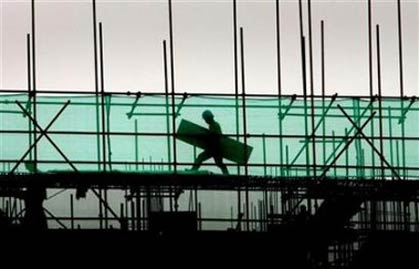China on Monday released proposed rules to limit foreign
investment in real estate amid quickening efforts to cool off the surging
economy, an official news agency said.

A
laborer works on scaffoldings at a construction site in Nanjing, China,
July 11, 2006. China on Monday released proposed rules to limit foreign
investment in real estate amid quickening efforts to cool off the surging
economy, an official news agency
said. [Reuters] |
The government has tried to rein in an investment boom by raising interest
rates, tightening lending rules and banning some construction projects outright.
Officials worry that excessive spending on assets could ignite inflation or
cause financial problems for banks if deeply indebted borrowers default on
loans.
Under the new rules, foreigners would face "restrictions on residential
property purchases," the Xinhua News Agency said, without giving details. It
said developers would be required to invest more of their own money in projects
to reduce heavy borrowing.
The rules are meant to "improve the efficiency of using foreign investment,"
Xinhua said. It didn't say when they would take effect.
A report last month by Dow Jones Newswires said the rules would limit
foreigners to buying homes only for their own use, and government approval would
be required to sell or transfer properties.
China has made several attempts to control frenzied
building of factories, luxury apartment and other projects that has turned its
cities into forests of construction cranes.
The government said last week that the number of new construction projects
jumped by 22.2 percent in the first half of the year, fueling a 11.3
percent rise in economic growth in the second quarter, the highest rate in a
decade.
Investment from Hong Kong and other sources outside China's mainland has
poured into real estate.
Foreign investment in Chinese real estate rose 27.9 percent in the first six
months of the year, compared with the same period of 2005, Xinhua said.
Investors apparently hope to profit from rising prices and an anticipated
rise in China's currency, the yuan, which would push up the value of mainland
assets in foreign currency terms.
The government raised interest rates in April, and economists expect another
rise in response to the latest announcement of strong growth
figures.